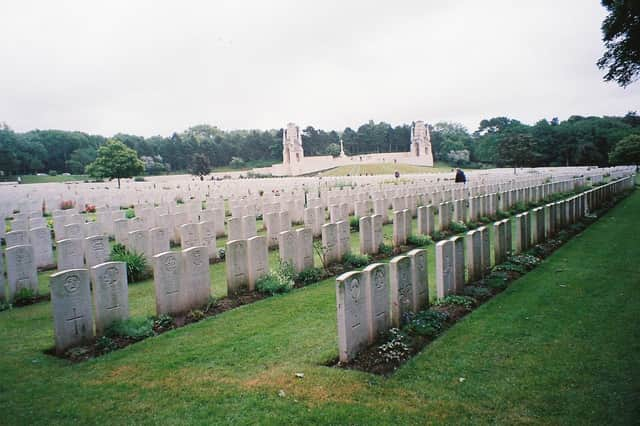Former Advertiser reporter remembers the heroes of Rugby, who gave everything so we could live in safety


Readers of this page will know how much I treasure the days of my youth spent in Rugby.
Like so many of the post-war 1960s generation, I messed about at school yet still managed to land a job, had what seemed to be plenty of spare cash in my pocket… and the time to spend it, too.
Advertisement
Hide AdAdvertisement
Hide AdWe baby boomers could dance the night away down at the Benn Hall, idle the hours away in the Il Cadore, sit with arms round our dates on the back seats of the Granada, and then lie in bed until midday on a Sunday in order to recover from it all.
Yes, we were truly blessed, weren’t we? I have often wondered whether or not there is such a thing as the Fates – and if so - how individual destinies are decreed.
Around this time of year I tend to reflect on what I would consider to be a life of luck, punctuated in turn by both fortune and misfortune.
Yet whatever troubles and travails have been encountered during my seven decades on Earth, they are as nothing compared to the experiences of the two preceding generations and the terrible ordeals of war that they were obliged to endure.
Advertisement
Hide AdAdvertisement
Hide AdYou may remember that I have, in previous columns, referred to a couple of Churchover lads who were killed during the First World War, Frank Sutton and Harry Hirons.
Frank died during the Battle of the Somme in September, 1916. Harry fell at Passchendaele, Ypres Salient, in the following year. Their bodies were never found, of if they were, could not be identified.
For a number of years, I wrote the publicity for a war research company, and accompanied this organisation to the battlefields of Europe. I was also privileged to narrate the history of the First Battle of Ypres as the coach began its journey up the Menin Road, up to Hooge and Gheluvelt.
I would relate, among other things, how my great-uncle had been wounded as the Germans broke through the ragged British line in late October, 1914, and point out the field where he fell… while reflecting how the notoriously thick Flanders mud still glistened in the thin, autumn sunshine.
Advertisement
Hide AdAdvertisement
Hide AdAnd I would wonder, as we probably all do at times, whether it was just possible if the long-departed could see their descendants, and be proud that they were being honoured and remembered in such a way.
Fanciful or even deluded talk, you might say. Yet believe me, whenever you walk in Flanders fields or the chalk uplands of the Somme, as I have done many times, you feel the presence of that damned generation.
A few years ago, I travelled with the research company to Wormhoudt, near Calais. It was in a barn near here that the German SS murdered nearly a hundred men of the Royal Warwickshire Regiment.
The Warwicks had staged a last-ditch stand to delay the enemy reaching Dunkirk. These brave sons of the Bear fought until their ammunition ran out, and then with no alternative, surrendered.
Advertisement
Hide AdAdvertisement
Hide AdThey should have been treated as prisoners of war, yet were cold- bloodedly killed after being herded into the barn. As the Germans machine-gunned and threw grenades into the tiny, crowded space, a sergeant in the Warwicks – Augustus Jennings of Rugby – threw himself on to a grenade in order to protect his men.
He was killed instantly. Greater love hath no man than this, that a man lay down his life for his friends…
I’ve visited the site of Sergeant Jennings’ heroic sacrifice twice. On the first occasion, the mayor of Wormhoudt attended a short service in memory of the men from across the sea who gave their lives so that his country could one day be free.
In his address, I remember the mayor referring to them as ‘the English martyrs’. Yes, of course, that’s what they were… and one of them was an ‘English martyr’ from my home town of Rugby.
Advertisement
Hide AdAdvertisement
Hide AdPride, admiration, sadness. These are words that get nowhere near how I felt on that morning in a cold damp, northern French field. And still feel to this day.
I am now in the twilight of my life. Not for me was ever the cold, cloying fear of combat, the snow and rain, the sleeplessness, the dread of anticipation. Not for me the hideous maiming, the pain of wounds, or the oblivion of death.
And not for me a life spent in a wheelchair, a facial injury that could only be hidden by a mask, or the eternal night of blindness.
Instead, what lay ahead for me was a life of freedom, where I could go wherever I pleased, meet whoever I wanted, and the time to enjoy those carefree, springtime days of youth when the open road of opportunity always beckoned.
Advertisement
Hide AdAdvertisement
Hide AdThese are always my thoughts at this time of Remembrance. I reflect on those Churchover boys who left home never to return. I think about
Augustus Jennings and the wife and baby back in Rugby he left forever back in 1940.
Yes. They all lie in foreign fields that are forever England. And they will never, ever be forgotten.
John Phillpott’s account of a pilgrimage to France and Belgium features in his book Beef Cubes and Burdock, available from bookshops and on the internet.